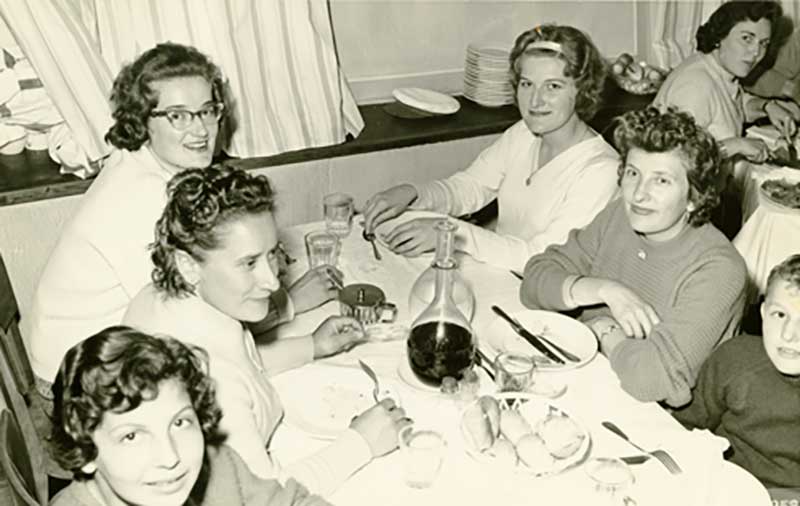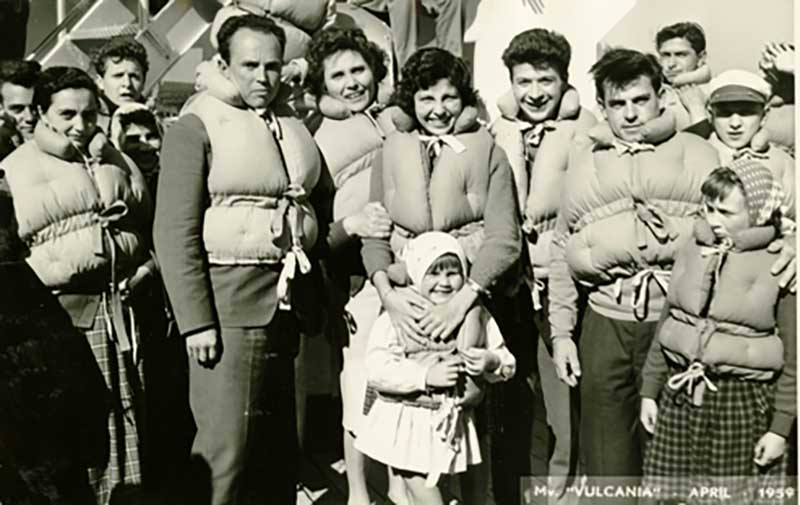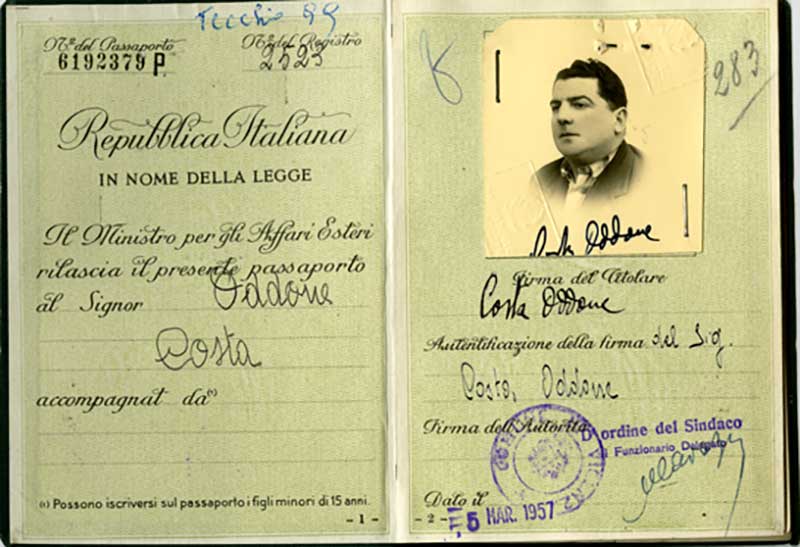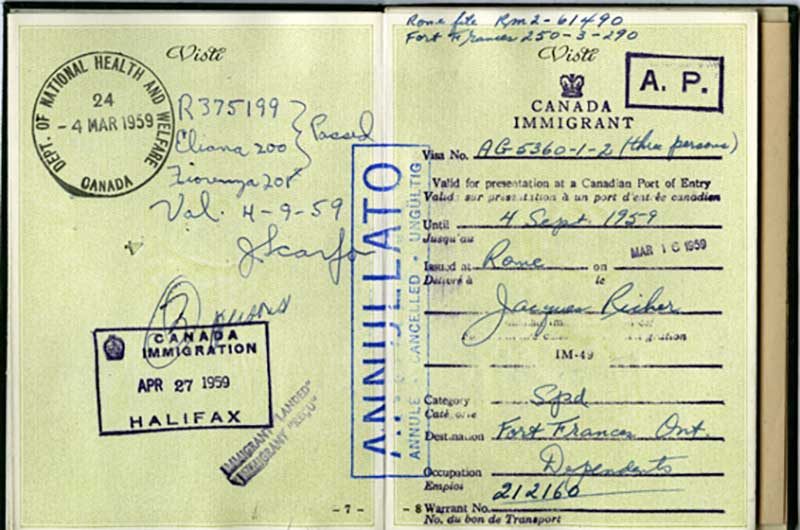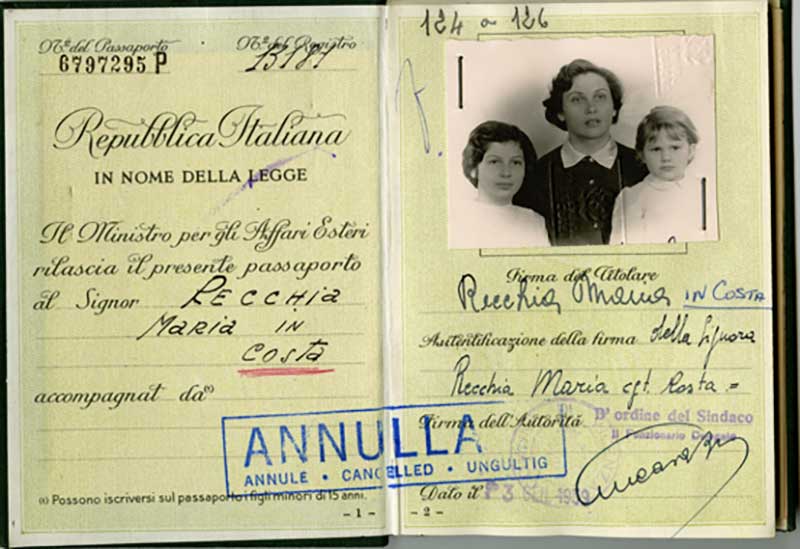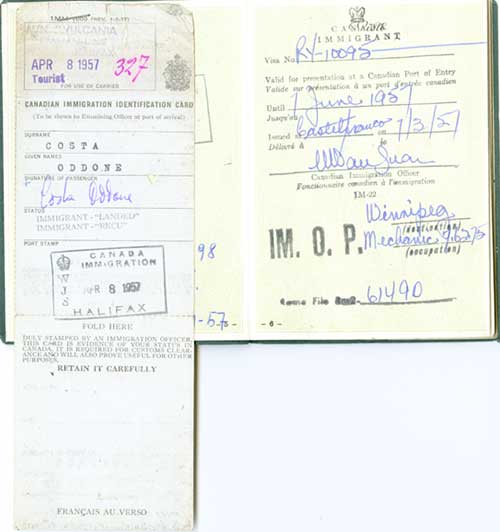Sobey Wall of Honour
Column
189
Row
3
MY IMMIGRATION STORY
April 27, 1959 was the day I arrived in Halifax, Canada along with my mother Maria and sister Fiorenza, after a 16 - day trip from Venice, Italy.
The day was foggy as our ship, Vulcania, docked at Pier 21.
The anxiety and excitement of our arrival were palpable among all the passengers, but especially me – excitement because the long and, at times, difficult trip on the water was finally at an end and anxiety because before us was the great unknown that was Canada and our new life.
We were coming to join my father, Odi, who had arrived 2 years earlier to start a new life here. The Italy of the 1950’s was a country trying to undo the ravages of the war and to rebuild an economy that was shattered. My father’s family business had been lost in the aftermath of the war and he wanted to build a better life for his family, especially his daughters. He wanted to give us, above all, the opportunity to attend university without economic constraints.
We left Venice on a clear, sunny and warm spring day. My godmother, one of my mother’s best friends, accompanied us to the departure pier.
My grandparents and the rest of the family couldn’t face seeing us leave and opted to say good bye at their house.
We all knew that it was very likely that we wouldn’t see some of our family members ever again. I never did see my beloved grandfather after our departure. He knew that, because of his age and the distance, he wouldn’t see his daughter and grandkids even one more time and couldn’t bear the pain.
As I stood on the deck of the ship, I vowed to myself that I would remember all the aspects of the trip ahead for future reference and so I began to record, in my mind, the various experiences as I saw them.
The trip along the Adriatic to Piraeus, Greece and indeed along the entire Mediterranean was smooth, full of beautiful sights, discovery of new places and picking up additional passengers along the way. Initially, it seemed like a holiday for all of us.
Once we reached Messina and then Naples, the reality of the journey that we were on started to sink in. We were farther and farther away from our homes, knowing full well that the ship wouldn’t be turning around, and we wouldn’t be going back any time soon.
In Messina, I saw, for the first time, the wrenching pain of entire families at the pier sending off loved ones- a litany of crying, desperation and prayers.
I have never forgotten those scenes and the effect they had on me then.
As we were about to leave the Mediterranean, Gibraltar was an interesting, short stop because vendors on smaller boats approached the ship and sold us fresh fruits and sweets using long poles to reach us on deck.
Next stop was Lisbon where we docked for the entire day, left the ship and did a small tour of the city. I marvelled at the beauty of the buildings, so similar yet so different from those of my home.
We were delayed leaving Lisbon as we waited for a member of the royal family to come on board. The cortege of red and yellow clad horses and a similarly attired carriage were a delight for all of us to see.
The smooth sailing ended abruptly as we circled the Azores and met the stormy waters of the Atlantic. Thus begun 5 days of seasickness for my mother but not for my sister and me. Meals were being served as per usual but every day, less and less people showed up.
I remember the plates sliding from one end of the table to the other as the ship tossed during the week-long storm. It was a game for us kids trying to catch the plates and trying to eat holding them firmly in our grasp.
Our cabin was in second class and for 4 people. The fourth passenger was a single young lady from a small town in the north of Italy who was going to meet a future husband she had never seen. Quiet and efficient, she helped look after my sister while mom was sick.
My Canadian adventure began once we docked at Pier 21 in front of a long, rectangular red-brick building, the gangplank was attached and we were ushered through a single steel door to a receiving area.
We were in this building for many long hours as each family went through the various stages of reception: passport/visa control, luggage and trunk checks, buying food in the little store inside the building and finally the move across the street to the train station to board the train that would take us elsewhere in Canada.
I have lingering impressions of that time in the reception area:
- the separation of the passengers into those of British/ Canadian citizenship (there were few) and the rest of us,
- the courtesy of the custom officials towards our family but not towards others who were treated almost with contempt,
- the waves of anxiety going through each family unit prior to getting the all clear to stay in the country - custom officials could still turn us back,
- my first taste of Velveeta cheese- the only cheese we could buy at the store,
- the language barrier- none of the custom officials spoke any other language- which we tried to overcome with pointing and smiling,
- the hard realization that this was the foreign environment that we would have to learn to survive in.
Once we officially entered the country, we were then taken to the train station to board the train that would disperse us to the various places in Canada that had been assigned as our final destination.
Our train - known in later folklore as the Immigrant Train - had wood benches for sitting and sleeping, was heated by coal stoves at each end of the carriage and had no food except what we had brought on board.
We had no idea how long the first train ride would be that would bring us to Montreal but the 3 of us settled into two facing benches for the duration.
I remember looking out in the middle of the night and being amazed to see little houses, each far away from the other, with small lights on and surrounded by huge amounts of snow. We had left Italy in the springtime but the countryside here was still in winter. At that moment, I was overwhelmed by sadness and loneliness and, for the one and only time, wanted to go back home.
Once we arrived in Montreal, we had a joyful reunion with my father.
He was waiting for us at the main station below the Queen Elizabeth Hotel. My mother was apprehensive that we would not look our best as our clothes were covered with soot from the train. I am sure my father didn’t even notice as he was so happy to be reunited with his family after 2 long years.
We overnighted in a suite at the Queen Elizabeth Hotel and the next day boarded the Canadian (a dream train) for our new home in Kenora, Ontario.
Arriving in Kenora was a total shock. The town was small; we had a small apartment and it was still cold in May.
I was enrolled immediately at the Catholic School to learn English and with the help of the teaching nuns during the summer, I was enrolled in my regular grade in September.
My school career had begun. I learned English quickly, was always at the top of the class and even started to translate for other Italians in need of government information, documents and courses. The Catholic Church even asked me to translate marriage preparation classes for new brides.
As we were the only Italian family in Kenora, our home became a hub for meals for lonely young men so far from home. Any Italian who arrived in Kenora, either as a new immigrant or as a visitor from southern Ontario, was immediately directed to our apartment and inevitably invited to stay for supper.
The hardest part for me, both in Kenora and later in Thunder Bay, was the integration into the Canadian way of doing things - friendships, dating, customs and cultural understandings. An outgoing person, I had left behind a wealth of friends that I knew would have sustained me through life.
I missed them terribly and wondered if I would ever fit in in this new place. Understanding teachers and peers, some of whom are still my friends, explained the few instances of discrimination directed towards me and guided me through the initial cultural adjustments.
My teenage years, as a result, were lonely and cautious with regard to peer relationships. I would choose very carefully the people that I would let into my private life and thoughts, afraid of being misunderstood or hurt.
I worked all through high school, not only to help with the family expenses, but also to interact with people of various backgrounds. I spent a lot of time reading English language authors - they schooled me in the social norms of the society I was growing up in.
That feeling of separateness ultimately faded at university when I realized I had become totally integrated in the Canadian environment.
Fortunately for me, my father was not the traditional Italian father- he let me make my own decisions and accepted my choices, always offering a safe and non-judgemental place to land in case of need.
As a family, we found a new beginning here in Canada. My father resumed his profession, learned to play golf and joined many clubs. My sister and I followed the desired path of our parents’ expectations - schooling, good paying jobs, friends and marriage.
My mother was perhaps the person who sacrificed the most in coming here. She left behind her parents, siblings and wonderful friends. She learned English through television and reading books. She followed my father’s dream of a new beginning and buried a part of herself in the process.
She never complained about the life she left behind and was extremely proud of becoming a Canadian citizen with my sister and I three years after our arrival.
Academically successful, I fulfilled my parents’ dreams of graduate and post-graduate degrees, followed by a wonderful career as a teacher, administrator in government and business owner.
I have travelled the world and each time I come back to Canada, I have a renewed appreciation for the opportunities given to me by this country and my parents’ decision to emigrate here.
Eliana Handford (Costa)
